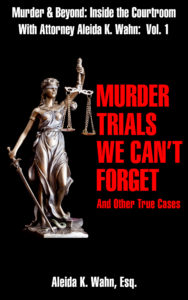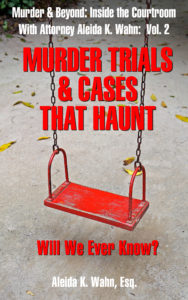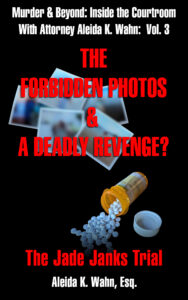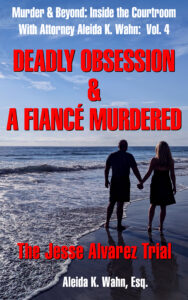
“This is a case about murder,” said Deputy District Attorney Keith Watanabe on September 14, 2015, as he began his two hour opening statement in the retrial of Julie Elizabeth Harper, who has admitted to killing her husband. On the morning of August 7, 2012, Julie Harper fatally shot her schoolteacher husband, Jason Harper, in the master bedroom of their Carlsbad home, while their three young children watched cartoons downstairs. Both Julie Harper and Jason Harper were thirty nine at the time.
In her first trial one year ago, Julie Harper testified she was the victim of verbal and sexual abuse during her ten year marriage, and that she accidentally shot her 6’ 6” husband during a violent argument in which she feared she would be raped or killed. A jury acquitted her of first degree murder in October of 2014, but could not agree on the lesser charges. A new jury of seven women and five men must now determine whether the shooting death was second degree murder, manslaughter, or whether she acted in justifiable self-defense after enduring years of abuse.
Julie Harper Intentionally Killed Her Husband Prosecutor Says
Attorney Watanabe told the jury that long before the shooting the marriage was falling apart and headed for divorce. It was the “perfect storm” he said. Julie Harper was abusing prescription medications, which had been prescribed for her autoimmune disease and rheumatoid arthritis, and was sleeping most of the day while the children were left unattended. Fifty-two narcotic pill bottles were found in the master bedroom on the day of Jason Harper’s death. Julie Harper was spending out of control and became a hoarder, with clothes burgeoning out of the closet and clutter piled everywhere continued Watanabe. Jason Harper grew angry and the couple argued frequently.
The killing was “intentional and unjustified” said Watanabe, and in the week before the shooting Julie Harper was already planning and manipulating. She stole $9,000 from Jason Harper’s personal accounts and took $10,000 from their daughter’s college fund. On the morning of the shooting, she shot her husband from behind, failed to call 911, concealed his body, and then embarked on a “day of deceit” in which she attempted to cover up what she had done declared Watanabe.
While her husband’s body lay on the bedroom floor, Julie Harper took her children to La Costa Coffee, where she purchased pastries for them and bought coffee for herself, then tried to arrange playdates for them, took her husband’s cell phone and sent a deceptive message to his family, moved his car, and hid the murder weapon detailed Watanabe. “You will never see the gun” he told the jury, as it has never been recovered to this day. He said Julie Harper planned to flee as she assembled a “getaway bag” containing $39,000 in cash, passports for herself and the children, social security cards, a will, and other financial documents. Watanabe implored the jury to ask themselves: “Are these the actions of a woman who killed in self-defense?”
Attorney Watanabe promised to prove that the shooting was not in self-defense, and that the killing was actually second degree murder. He acknowledged that Jason Harper was verbally abusive and used “harsh language,” but he dismissed the claims of physical abuse and rape. Julie Harper never listed rapes in her divorce filing, she never made the claim to her family or friends, and violence was unsupported by the children’s testimony said Watanabe. Julie Harper kept journals in which she documented “every minutia of her life but there is not a single mention of physical abuse in them,” and when she surrendered to police “there was not a single injury on her body,” exclaimed Watanabe. Julie Harper was lying. Seventeen days after killing her husband, she wrote a letter from jail to her former fiancée in which she showed no remorse or care about her husband, and closed her letter with the words, “to the love of my life.”
Julie Harper Was A Victim of Abuse and Killed In Self Defense
Defense attorney Paul Pfingst began his opening statement by telling the jury that it did not make any sense that a thirty nine year old mother of three, who had filed for divorce, just decides one day to shoot her husband for no reason while the children were watching television. There had to be more to this story. He said an undisputed fact in the case was that Julie Harper was an abused spouse, and then to prove his point played a recording which Julie Harper had secretly taped during an argument on the eve of the couple’s tenth year anniversary.
On the recording, Jason Harper is heard repeatedly calling his wife a “f****** b****” as they argue over child care and money issues. Jason tells her that the money he earns as a teacher is his money, and that it will only be their joint money when she contributes. An emotional Julie is heard saying, “I have an abusive husband who calls me names and won’t let me spend any of our money.” When she asks about going out to celebrate their anniversary, he coldly tells her, “I don’t give a sh** about our tenth anniversary. I’ve already said our marriage sucked a**. I’ve already said I’d want a divorce if it was not for our kids. You think I give a sh** about ten years? God, what world do you f****** live in? I am here only for the kids.” Pfingst said that these types of arguments were a regular event and that this particular argument was actually benign.
Attorney Pfingst told the jury that the marriage had deteriorated to the point that it had become “toxic.” Jason Harper grew to despise his wife and he resented her lack of financial contribution to the family finances. During the marriage, Jason Harper demanded that Julie contribute $3,000 per month to the household expenses, even when she ceased working, was taking care of the couple’s three small children, and was suffering from extensive medical problems. She paid the money from pre-marriage savings, inheritance money, and gifts received from her family, until she eventually told her husband she was unable to do so. Jason Harper was livid.
Julie Harper was verbally abused, and that was a matter not in dispute insisted Pfingst. On a regular basis, Jason Harper would curse at Julie and threaten her in front of the children, until she would be reduced to tears. He would also yell at the children, causing them to be in fear. The day after their father died, the two older children, who were six and eight at the time, were interviewed by a social worker who was experienced in domestic violence matters. Attorney Pfingst read their statements where the children said their mother would lock the bedroom door to be safe, and that their father took off the door knobs so that she could no longer lock the door. The son Jake also told the social worker, “He doesn’t care about her because she doesn’t pay half the bills,” that his dad called his mom a “F****** B****,” and that “Mom is always crying, sad.” The daughter Jackie said, “Mommy locked the door to be safe from a bad day” and “Daddy just can’t stand mommy.”
Attorney Pfingst said that Jason Harper would force Julie to have sex as punishment when he was angry with her, and would tell her how ugly and fat she was during the sex act. Julie Harper made notations in her day-timer about the rapes, and she sent these documents to her ex-boyfriend, who had remained a good friend, as a way to document the rapes and what was going on in her life.
Julie Harper did not assemble a “getaway bag,” said Pfingst. The bag was packed way in advance of the shooting and was a bag domestic violence victims are instructed to always keep at hand in the event they must flee immediately. Julie Harper needed cash to be able to support herself and legal documents for the children to be able to enroll them in a new school.
Five days before the shooting, Julie Harper went to the court for help when she filed for divorce. As a devout Catholic her entire life, divorce was a hard decision for her as her religion did not recognize divorce, but she could no longer take the constant abuse. Attorney Pfingst said that it was humiliating for her to write about the rapes in a public divorce filing, and that not all options are open for victims of domestic violence.
Julie Harper was afraid of Jason Harper, and feared what he would do once he found out that she had filed for divorce. On the morning of the shooting, an argument started over Jason’s computer, but escalated out of control when Julie revealed to him that she had filed for divorce and he learned that his teacher’s union would not pay for his divorce lawyer. “He was a force and fear to be reconciled with! She filed for divorce without his permission! She took money from joint accounts without his permission!” thundered Pfingst. Jason Harper was enraged, tried to rip off her clothes, and Julie Harper got to the gun.
The testimony of the children corroborate Julie Harper’s story continued Pfingst. Jake said that his dad “was pretty pissed” and “looked like he was going to explode.” Both children heard their father yelling at their mother, and their mother speaking sternly in response. Attorney Pfingst said that Julie Harper was not acting in an aggressive manner. The children next heard a thud and went upstairs to the master bedroom where they found their mother in a state of undress. Attorney Pfingst closed by saying that Julie Harper had the right to defend herself and that no crime was committed.
The Children Are Expected to Testify
The two children, who are now nine and eleven, are expected to again testify in the trial. Julie Harper’s parental rights were terminated after the shooting and the three children were adopted by Jason Harper’s parents. Julie Harper could face forty years to life in prison if convicted of second-degree murder and the special allegations of personal use of a firearm and personal discharge of a firearm. She remains free on a $2 million bond and continues to live in the Carlsbad house the Harper family once called home.
To See Media Coverage of the Case, Please Go To:
To Read More of Aleida’s True Crime Stories from Inside the Courtroom, Please Go To:
About Aleida K. Wahn, Esq.

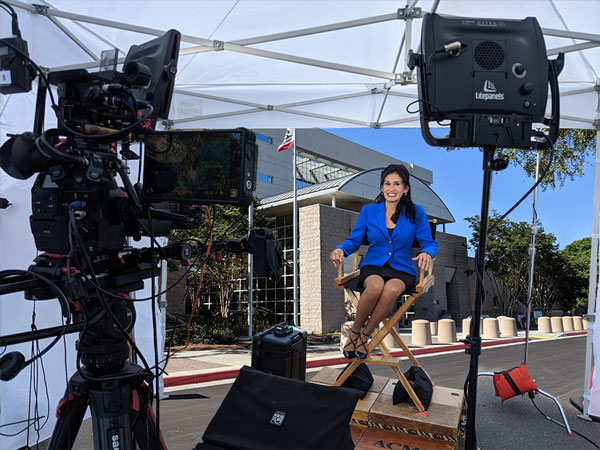
I am an attorney, award-winning true crime writer, and legal analyst of criminal cases. I cover criminal trials and write stories and books about compelling, gripping, and unforgettable cases that impact our world. I take you into the courtroom in high-profile murder trials, rape cases, crimes of passion, cases involving mental illness, deviant behavior, and more. I have a deep passion for true crime, criminal law, and all aspects of the criminal justice system. I have appeared as an expert on true crime shows, including “48 Hours,” “Snapped,” "Peacock TV's Tik Tok Star Murders," and “The Dead Files,” and provided legal analysis on high-profile criminal trials on Court TV, the Law & Crime Trial Network, Fox 5 News, ABC 10 News, and KUSI News. I also create and host shows with the Del Mar Television Producers Group, addressing criminal justice and social issues in recent criminal trials.
I provided my insight and legal analysis on Court TV and the Law & Crime Trial Network of the high-profile trial of former NFL star Kellen Winslow Jr. It was a trial that captured the nation as the heralded ex-football star with fame, fortune, and a famous name stood accused of multiple rapes and other sex crimes involving five women. As the trial delved into shocking facts, complicated legal issues, and unexpected twists and turns, I was there for every minute. After the trial, I wrote a book on the case, going behind the headlines to share the extraordinary details of what happened inside the courtroom. Judging Winslow Jr.: From NFL Star to Serial Rapist? Inside the Shocking Rape Trial of Kellen Boswell Winslow II is now available on Amazon.
I am passionate about telling true crime stories, as these penetrating stories have the power to move us all, while highlighting societal issues which need to be addressed. I have personally seen the human devastation which is present in each trial and believe there is a lesson to be learned in every single case. It is through awareness and examining critical issues society can effect change and even make new laws. To learn more, please visit: https://www.aleidalaw.com.
Read about the gripping and unforgettable trials that I have covered in my latest books:


